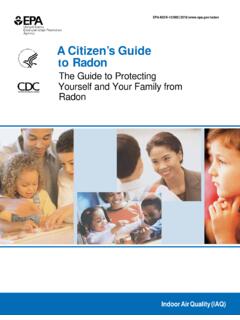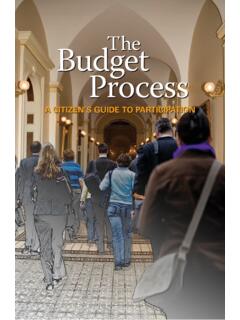Transcription of A CITIZEN S GUIDE TO FILING APPEALS IN THE COURT OF ...
1 1 A CITIZEN S GUIDE TO FILING APPEALS IN THE COURT OF APPEALS OF GEORGIA NOTE: (1) This GUIDE is for self-represented parties, or parties not represented by attorneys. (2) Parties must check the latest statutes and COURT rules, as this GUIDE may not have the latest information. December 2019 2 TABLE OF CONTENTS 1. 2. Information about the COURT of 3. Basic FILING 4. Appealing a Case: An 5. Direct 6. Discretionary 7. Interlocutory 8. 9. Helpful 10. The Georgia COURT 11. Frequently Asked 12. Sample Forms Form 1: Affidavit of Form 2: Discretionary/Interlocutory Form 3: Appellant s Form 4: Appellee s Form 5: Motion for Extension of Time to File a Form 6: Motion for Form 7: Motion to Supplement the Form 8: Request for Oral Form 9: Motion to Withdraw Form 10: Notice of Intention to Petition for Writ of 3 Form 11: Notice of FILING of Petition for 13.
2 Attachments A. Checklist for Appellant s Brief ..44 B. Checklist for Appellee s Brief ..47 C. Checklist for Discretionary Appeal Application ..49 D. Checklist for Interlocutory Appeal E. Jurisdictional Statutes and Constitutional F. OCGA 5-6-34 Cases that Are Directly Appealable ..55 G. OCGA 5-6-35 Cases Requiring Application for Appeal ..57 H. Direct Appeal I. Applications J. Important K. Common Reasons Briefs or Motions Are L. Common Reasons Applications Are M. Common Reasons Other Documents Are 14. 4 1. INTRODUCTION This GUIDE is intended to help self-represented parties, or parties who represent themselves without a lawyer, by providing basic information about the APPEALS process in Georgia and the steps that must be taken in appealing to the COURT of APPEALS of Georgia.
3 This GUIDE is not legal advice and may not be cited as legal authority. Parties are strongly encouraged to obtain a lawyer to represent them in an appeal. The rules are complicated, and there are important deadlines that must be met. The failure to follow rules or meet deadlines may and often does result in an appeal being lost or dismissed. Such failure may also result in documents being returned to a party for correction. The COURT may also return documents for corrections. For parties who decide to represent themselves, it is important to read and understand this COURT s rules and the Georgia statutes (laws) regarding APPEALS . This GUIDE should be used along with those relevant COURT rules and Georgia statutes, which will be referred to throughout this GUIDE .
4 This GUIDE is not all-inclusive, and it is not a substitute for reading and understanding the rules and statutes. You are not allowed to file pleadings (documents) on behalf of anyone other than yourself unless you are a licensed attorney admitted to practice in this COURT . A corporation must be represented by a licensed attorney and may not be represented by an employee, director, or officer of the corporation. See Eckles v. Atlanta Technology Group, Inc., 267 Ga. 801 (1997). Although you have the constitutional right in Georgia to represent yourself, the unauthorized practice of law representing someone else is forbidden and may subject you to criminal penalties. See OCGA 15-19-51.
5 Contact by any party with a judge of this COURT or any member of a judge s staff is strictly forbidden. All communication with the COURT must be by written documents filed with the Clerk of COURT , along with copies served upon (mailed to) opposing counsel and any parties without lawyers. Also, staff of the Clerk s Office are not allowed to give you suggestions or legal advice or make any specific recommendations about how to pursue an appeal or defend against an appeal. Please note that all documents filed by self-represented parties must be in paper format. Self-represented parties may submit an email address to the Clerk of COURT to receive unofficial copies of opinions or orders, but the Clerk is required by law to send you a written copy of these documents by mail.
6 Attorneys practicing in this COURT must submit all documents electronically. The OCGA is the Official Code of Georgia Annotated, which are the laws of Georgia. In this GUIDE there are specific OCGA sections that relate to FILING both an appeal and an application to appeal. On pages 11 and 12 there is a summary of OCGA 5-6-34. Additionally, on pages 57 through 58 there is a more in-depth version of OCGA 5-6-34. On pages 17 through 19 there is a summary of OCGA 5-6-35. On pages 59 through 60 there is a more in depth version of the OCGA 5-6-35. 5 2. INFORMATION ABOUT THE COURT OF APPEALS The COURT of APPEALS of Georgia is the intermediate appellate COURT for the State of Georgia. The COURT of APPEALS reviews APPEALS from the trial courts or lower courts when jurisdiction is not exclusively reserved to the Supreme COURT of Georgia or other courts.
7 (See Section 11: the Georgia COURT System, in this GUIDE ). Cases come to the COURT of APPEALS in three ways: by direct APPEALS , or APPEALS by right; by granted applications for discretionary appeal, or APPEALS the COURT agrees to hear at the end of a case; and granted applications for interlocutory appeal, or APPEALS before a trial ends that the COURT agrees to hear. The COURT of APPEALS has fifteen judges, who are divided into five divisions. Each division has three judges, one of whom is a presiding judge. Generally, an appeal will be decided only by those three judges. All of the judges review the record, the briefs, and the relevant law. The judge assigned to the case looks at the appeal first and writes a decision or order, then the other two judges read the decision or order and agree or disagree with the first judge.
8 In rare cases, such as when the COURT consider whether to change its case law or the issue is extremely important, all fifteen judges of the COURT will decide an appeal. The Clerk s Office of the COURT of APPEALS is open Monday through Friday from 8:30 to 4:30 The office is closed on state holidays and during extremely bad weather. We will post a notice on the COURT s website, under the Announcements tab, when the Office is closed because of bad weather. Website Mailing Address COURT of APPEALS of Georgia Clerk of COURT 330 Capitol Avenue, 1st Floor Suite 1601 Atlanta, Georgia 30334 Telephone 404-656-3450 Rules of the COURT of APPEALS NOTE: When we refer to Rules in this GUIDE , we mean the Rules of the COURT of APPEALS of Georgia.
9 6 3. BASIC FILING PROCEDURES A. FILING DOCUMENTS IN THE COURT OF APPEALS All self-represented parties must submit documents in paper format. (Attorneys admitted to practice in this COURT must file all documents electronically.) Any document submitted to the COURT must be filed with the Clerk s office, be signed by the party or counsel, and contain a proper certificate of service showing that it was mailed to the opposing party or counsel. See the example of a certificate of service at the end of Form 2. Only file one original of any document. See Rule 6. Documents may be mailed to the COURT of APPEALS , sent by express mail or courier service, or hand delivered. Fax filings are not accepted. Incarcerated parties (prisoners) who are representing themselves on appeal may file documents with prison officials for forwarding to the Clerk s office.
10 See Rule 4. The Clerk s office closes at 4:30 All filings must be submitted by that time. B. COSTS The cost of FILING a direct appeal or an application to appeal is $80 for criminal cases and $300 for civil cases. Application costs must be paid when the application is filed. If you file a direct appeal, you must pay the costs by the time you file your brief. Fees may be paid by cash, check, or money order. See Rule 5. The Clerk cannot accept an application or a brief for FILING without the FILING fee unless (1) it is accompanied by an adequate pauper s affidavit, (2) the self-represented party is incarcerated, or (3) in represented cases, the attorney for the party was appointed due to the party s indigence.








